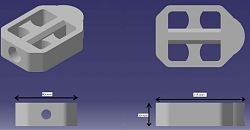Viability of Distributed Manufacturing of Bicycle Components with 3-D Printing: CEN Standardized Polylactic Acid Pedal Testing
Recent advancements in open-source self-replicating rapid prototypers (RepRap) have radically reduced costs of 3-D printing. The cost of additive manufacturing enables distributed manufacturing of open source appropriate technologies (OSAT) to assist in sustainable development. In order to investigate the potential this study makes a careful investigation of the use of RepRap 3-D printers to fabricate widely used Black Mamba bicycle components in the developing world. Specifically, this study tests pedals. A CAD model of the pedal was created using parametric open source software (FreeCAD) to enable future customization. Then poly-lactic acid, a biodegradable and recyclable bioplastic was selected among the various commercial 3-D printable materials based on strength and cost. The pedal was 3-D printed on a commercial RepRap and tested following the CEN (European Committee for Standardization) standards for racing bicycles for 1) static strength, 2) impact, and 3) dynamic durability. The results show the pedals meet the CEN standards and can be used on bicycles. The 3-D printed pedals are significantly lighter than the stock pedals used on the Black Mamba, which provides a performance enhancement while reducing the cost if raw PLA or recycled materials are used, which assists in reducing bicycle costs even for those living in extreme poverty. Other bicycle parts could also be manufactured using 3-D printers for a return on investment on the 3-D printer indicating that this model of distributed manufacturing of OSAT may be technically and economically appropriate through much of the Global South.
For more information, visit the project's page on Appropedia:
https://www.appropedia.org/Viability..._Pedal_Testing
Download the academic paper here:
https://www.academia.edu/33287420/Vi..._Pedal_Testing



 LinkBack URL
LinkBack URL About LinkBacks
About LinkBacks



 Reply With Quote
Reply With Quote
Bookmarks